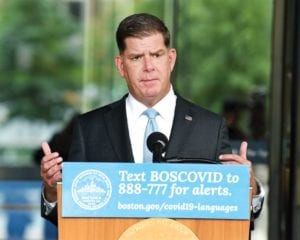The ink had barely dried on the 2020 primary ballots before local political pundits turned their attention to the 2021 electoral cycle last week, after Mayor Martin Walsh confirmed that at-large City Councilor Michelle Wu is running for the seat he now holds.
With Wu’s actual announcement, made Tuesday morning, the 2021 campaign season has officially begun.
Wu, who has championed making the MBTA free, called for the elimination of the city’s Boston Planning and Development Agency and voted against the mayor’s 2021 budget while calling for cuts to Boston Police Department funding will most likely be running to the left of Walsh — following in the footsteps of U.S. Rep. Ayanna Pressley, a former at-large councilor who took out incumbent Congressman Michael Capuano.
Pressley’s 2018 victory and those of others who ran left of progressive incumbents, including Nika Elugardo and Jonathan Santiago, are indicative of a leftward shift in the Boston and Massachusetts electorate, observers say. That shift has Walsh embracing positions like support for a civilian police review board that even a year ago he opposed.
That same dynamic is playing out across the city and across the state, notes State Rep. Russell Holmes, who says his solidly Democratic Mattapan-based district is also drifting to the left.
“There’s not a Democrat in Massachusetts who’s not moving to the left,” he said. “We’re all watching our left flank.”
Over the last few years, Wu has been claiming an increasingly large swath of issues that position her to the left of Walsh. Her focus on transportation and reform of the city’s often-troubled development processes has earned her headlines over the last two years. Most recently, she led her colleagues on the council in blocking Walsh’s planned appointment of two members to the Zoning Board of Appeal, calling for more representation from community groups on a board long criticized for being dominated by real estate development interests.
But will it work?
There’s no clear indication of to what extent the leftward shift in Boston politics will work in Wu’s favor next year. Pundits point out that no incumbent Boston mayor has lost to a challenger since 1949 when John Hynes defeated James Curley after the latter had been indicted on public corruption charges.
Walsh, who handily beat back a challenge by left-leaning former District 7 City Councilor Tito Jackson in 2017, has more than $5 million in his campaign war chest, more than 10 times the $346,592 Wu reported in her Aug. 31 filing with the state.
Wu was first elected in 2013, the same year Walsh won election to the mayor’s office. Her political stands have evolved over the last seven years. She voiced opposition to rent control in 2013, then eventually embraced the measure during the 2019 at-large race. In 2013, she angered progressives and black political activists by opting to back conservative-leaning District 2 Councilor Bill Linehan for the council presidency over Pressley, a move some voters haven’t forgotten.
Wu was the top vote-getter in the 2017 and 2019 at-large races, winning votes in majority white and majority African American precincts across the city. While Walsh has typically done well among the more conservative-voting, traditionally Irish-American precincts in Dorchester, South Boston and West Roxbury, the city’s electoral map is changing, as gentrification has pushed many white ethnic voters out of the city and white progressives have begun to flex their muscle in municipal elections.
In 2013, Irish-American candidates dominated the vote in West Roxbury-based Ward 20, with Martin Keough winning more votes there than any other candidate. In 2019, it was Wu who won the most votes in Ward 20, beating out longtime at-large Councilor Michael Flaherty, 4,440 votes to 3,610 votes.
The growth of the activist groups Progressive West Roxbury/Roslindale and Jamaica Plain Progressives has helped candidates of color pick up votes in neighborhoods that in past years they might write off. Those groups regularly hold forums where candidates are asked their positions on progressive issues such as support for rent control and curbing police abuse.
Shifts have also occurred in Hyde Park, a majority people of color neighborhood that has long been dominated by Irish-American and Italian-American city councilors. In 2019, Ricardo Arroyo became the first person of color elected to the council from that neighborhood. Then, in March, a coalition of Black, Latino, Haitian and progressive white activists wrested control of the Ward 18 Democratic Committee from the mostly white group that had long dominated the city’s largest ward committee.
What to expect next year
While in years past, Boston’s electorate based support for candidates primarily on ethnicity and neighborhood affiliation, now it’s candidates’ stands on public policy issues that drives voter interest, notes Rachel Poliner, an organizer with Progressive West Roxbury/Roslindale.
“Now the City Council is more like the city’s creative think tank,” she said.
Poliner maintains that the city of Boston’s 311 line for city service complaints has rendered councilors’ constituent services less relevant.
“People like that,” she said. “Now they associate councilors with different issues.”
In last year’s City Council election, Poliner’s group, JP Progressives and progressive-leaning ward committees held numerous candidate forums, which were livestreamed on social media. Candidates’ answers were entered into spreadsheets, giving voters access to their stands on issues.
“People are supporting candidates because they believe in a candidate, whether or not there’s a clear path to victory,” said Ziba Cranmer, a co-chair of JP Progressives. “There are a lot of people in the progressive camp who believe their votes should align with their positions on issues.”
That type of support has aided upstart campaigns, including Pressley’s upset victory over 10-term incumbent Capuano and Rachael Rollins’ uber-progressive victory in the 2018 race for the Suffolk County District Attorney’s seat.
It also helped progressive candidates like Julia Mejia and Liz Breadon win seats on the council, shifting the body that was long dominated by white men into a majority female, majority people of color council.
Next year, at least one challenger is looking to take down one of the council’s remaining four white men. Kendra Hicks, a Dominican-born co-director of a local foundation, is planning to take on District 6 incumbent Matt O’Malley in a race for the Jamaica Plain/West Roxbury district.
In 2021, those running for the council and mayor’s office could well face a similar barrage of questions as progressive groups and civic associations vet candidates on the issues. Last year, candidates at the JP Progressives forum were asked whether they would support the abolition of the Boston Police Department’s controversial gang database, whether they would support rent control and whether they would support a change to an elected school committee.
This year, a clear fracture has appeared on the council, with Black and Latino members voting against the mayor’s budget over demands for a cut in police funding, while all the white councilors voted for it. Wu sided with the councilors of color.
Next year, issues including the use of high-stakes testing for admissions to the city’s exam schools and the growing police overtime budget could serve as the wedge issues that attract or repel Black, Latino and progressive white voters.
As mayoral and City Council candidates hit the campaign trail, political activists will make sure those issues remain front and center.
“I think having a lot of candidates and a robust debate is going to be the best outcome for democracy,” Cranmer said.



